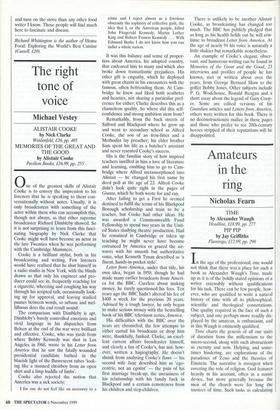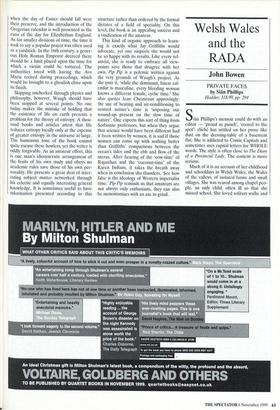Amateurs in the ring
Nicholas Fearn
TIME by Alexander Waugh Headline, £18.99, pp. 277 PIP PIP by Jay Griffiths Flamingo, £12.99, pp. 290
In the age of the professional, one would not think that there was a place for such a book as Alexander Waugh's Time, made up as it is of the boldly stated opinions of a writer ostensibly without qualifications for his task. There can be few people, how- ever, who are qualified to write a natural history of time with all its philosophical, scientific and theological connotations. One quality required in the face of such a subject, and one perhaps more readily dis- played by the amateur, is enthusiasm, and in this Waugh is eminently qualified.
Time charts the genesis of all our units of duration from the millennium to the micro-second, along with such abstractions as eternity and now. Helping, and some- times hindering, are explorations of the paradoxes of Zeno and the theories of Einstein. The narrative is strongest when covering the role of religion. God features heavily in his account, often as a comic device, but more generally because the men of the church were for long the trustees of time. Such tasks as calculating when the day of Easter should fall were their preserve, and the introduction of the Gregorian calendar is well presented as the euro of the day for Elizabethan England. As for smaller divisions of time, the time it took to say a popular prayer was often used as a yardstick. In the 16th century, a gener- ous Holy Roman Emperor decreed there should be a limit placed upon the time for which a victim could be tortured. The authorities toyed with having the Ave Maria recited during proceedings, which would be brought to a ghoulish close upon its finish.
Skipping unchecked through physics and philosophy, however, Waugh should have been stopped at several points. No one today makes the mistake of holding that the existence of life on earth presents a problem for the theory of entropy. A thou- sand books and articles attest that life reduces entropy locally only at the expense of greater entropy in the universe at large. The humorous tone of the book cannot quite excuse these howlers, yet the writer is oddly forgivable. As an amateur effort, this is one man's idiosyncratic arrangement of the fruits of his own study and obeys no academic rules save those of his own per- sonality. He presents a great deal of inter- esting subject matter networked through his eclectic and equally interesting general knowledge. It is sometimes useful to have information presented according to this structure rather than ordered by the formal dictates of a field of speciality. On this level, the book is an appealing success and a vindication of the amateur.
This kind of organic approach to learn- ing is exactly what Jay Griffiths would advocate, yet one suspects she would not be so happy with its results. Like every rel- ativist, she is ready to embrace all view- points save those that disagree with her own. Pip Pip is a polemic written against the very grounds of Waugh's project. As she puts it, 'while the dominant, linear cal- endar is masculine, every bleeding woman knows a different female, cyclic time.' She also quotes Jean Chesneaux approvingly: the use of heating and air-conditioning to control nature's time is 'imposing our wound-up present on the slow time of nature'. One expects this sort of thing from Sorbonne professors, but when they argue that science would have been different had it been written by women, it is sad if those women can come up with nothing better than Griffiths' comparisons between the ocean's tides and the ebb and flow of the uterus. After hearing of the 'cow-time' of Rajasthan and the 'coconut-time' of the Karen Indians, it takes the breath away when in conclusion she thunders, 'See how false is the ideology of Western imperialist time.' Pip Pip reminds us that amateurs are not always only enthusiasts, they can also be monomaniacs with an axe to grind.



























































































 Previous page
Previous page